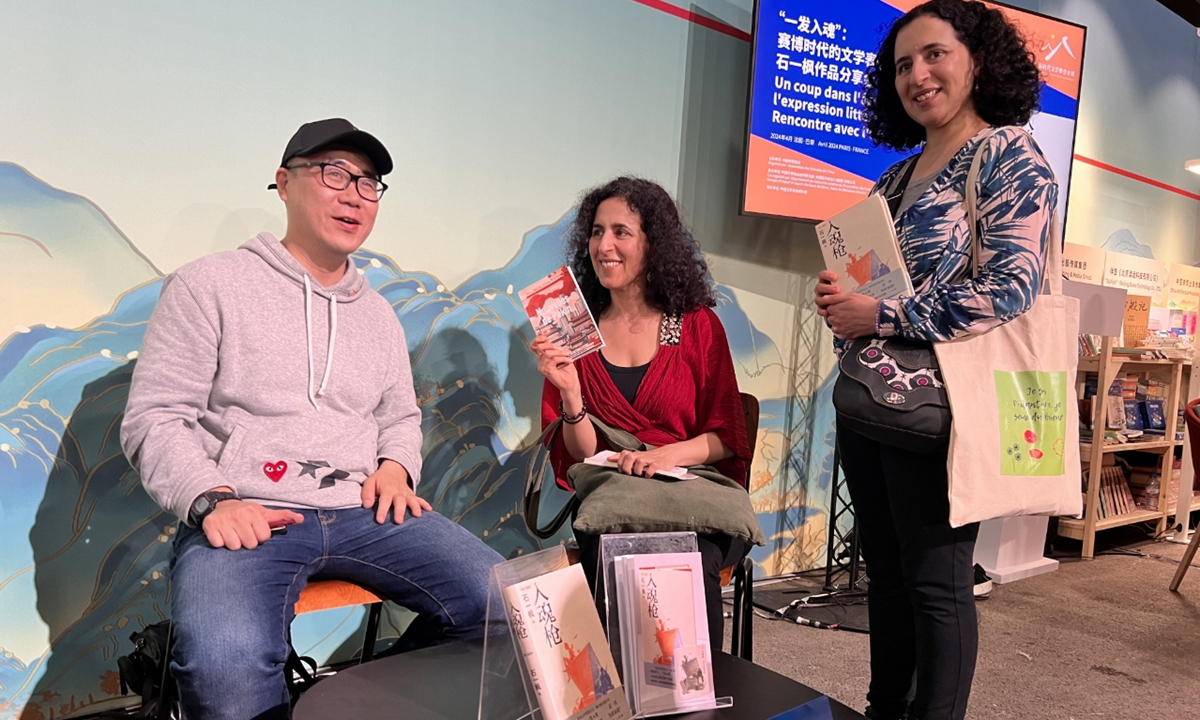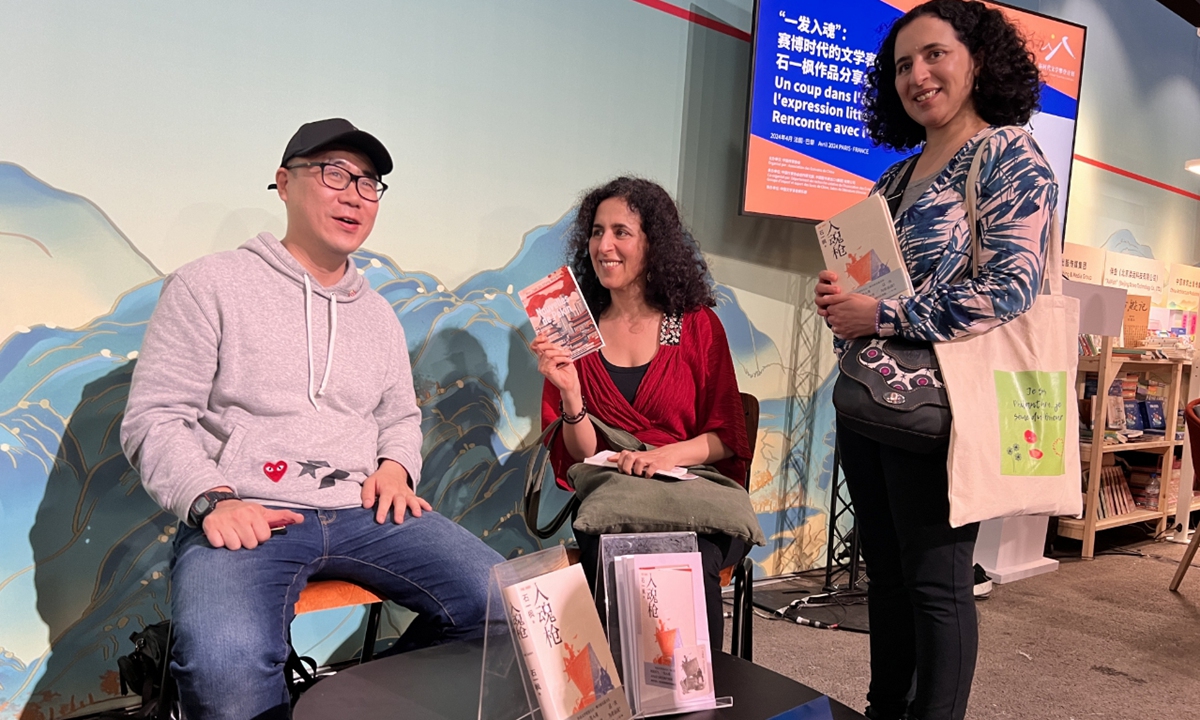
Chinese writer Shi Yifeng (left) attends a literary salon at the Paris Book Festival in Paris, France on April 14, 2024. Photo: Courtesy of China National Publications Import and Export (Group) Corporation
A series of literary salons and promotional activities were held by Chinese publishers during the 2024 Paris Book Festival from Friday to Sunday in the French capital, the latest event marking the 60th anniversary of the establishment of diplomatic relations between China and France.
A total of 59 Chinese publishers from Beijing, Shanghai, Hebei, Zhejiang and other places took part in the festival, displaying about 1,150 types of books on subjects such as literature and traditional Chinese culture, with French-language books accounting for more than 40 percent.
On Friday afternoon, The National Library of France (NLF) received donations from the Beijing Federation of Literary and Art Circles (BFLAC) to mark the 60th anniversary of bilateral relations.
Chen Ning, Party secretary of BFLAC, told the Global Times that the donations –
Complete Works of Lao She and outstanding contemporary literary works from Beijing – represent the level of contemporary literature in China and reflect the temperament and pursuits of Chinese writers.
“Through this donation, we hope that more French readers will like to read and love Chinese literature. Moreover, we hope to contribute to the vibrant and enduring friendship between the two countries,” said Chen.
Damien Chatagnon, director of the International Literature Center of NLF, said that since the establishment of the library’s Chinese department, it has been dedicated to discovering the finest contemporary Chinese literary works.
“We believe that this donation will further open windows for French audiences to appreciate Chinese culture and serve as crucial material for French readers to understand contemporary Chinese literature,” said Chatagnon.
The annual book festival features events for the Literature Summit Plan for A New Era – The Sailing Project, in which the China Writers Association (CWA) works with literary publishers, journals, book companies and other organizations to build a whole ecological chain of literary production, dissemination, transformation and translation, and to launch outstanding literary works.
As 2024 also marks the China-France Year of Culture and Tourism, the activities aim to promote the books selected for the project overseas through copyright exports and cultural exchanges, promote the development of a matrix for the export of Chinese books with copyright protection, and advocate for the advancement of Chinese culture globally.
At one of the events, Chinese writer Ye Mi and French translator Rebecca Peyrelon exchanged views on women’s awakening and strength in feminist literature based on Ye’s novel Never Get Old, giving readers a glimpse of the richness of women’s images in Chinese literature and the vitality of women’s writing in changing times. Ye’s novel, which focuses on the protagonist’s love affair against the background of China’s reform and opening-up movement, has received rave reviews in the French publishing industry.
Ye, who is also a vice chief of the Writers Association of Jiangsu Province in East China, told the Global Times that the book fair selected her book for its distinctive style.
“When they choose novels, the organizers will take into account different styles and types. My book is about a woman with an independent spirit who pursues her own happiness, which belongs to a unique category in the book trade, so they selected this novel,” said Ye.
In recent years, the Chinese publishing industry has seen positively looking for overseas collaborations. Zhang Yiwu, a professor of Chinese language and literature at Peking University, told the Global Times that the presence of Chinese books at international event reveals the book’s “important function of promoting cultural exchange,” and “enlarges the scope of exchanges in the humanities.”
Chinese publishing industry analyst Jin Hong told the Global Times that today’s Chinese book market encourages books that are “socially oriented and focus on the common values of mankind.” Emerging subjects such as “woman’s spirits,” “elderly care” as well as the “re-discovery of marginalized social groups” were major themes presented in Chinese books across various genres.
“The reason why overseas readers are fascinated with Chinese books is because they share these books that deliver human values,” Jin remarked.
Aside the current French fair, Jin told the Global Times that the Chinese publishing industry collaborates with overseas organizations in many different ways other than mere “exhibitions.”
“As far as I know, a lot of Chinese universities and publishers have carried out mutual-language interpretation projects with countries like the UK and Pakistan. Other than promoting Chinese books, the industry also promotes Western literature among Chinese readers,” Jin noted.
At another event during the festival, Deanna Gao, founding president of French-Chinese Cultural Association; Sonia Bressler, president of La route de la Soie (French Silk Road Publishing House); and Chinese writer Qiao Ye discussed Qiao’s Mao Dun Literature Prize winning work Baoshui Village.
They tackled the profound changes experienced by the Chinese countryside in the context of the new era, and delved into the richness of life in China’s rural areas, showing the audience the landscape of China’s modernization.
At a salon themed on “Literature in the cyber age,” Chinese writer Shi Yifeng and French translator Marion Darbois discussed the common issues faced by Chinese and French teenagers growing up with the rapid development of technology.
Such an event opened a window for French readers to better understand China’s contemporary gaming culture and literary creation, and allowed them to have a glimpse of the life and spiritual pursuit of young Chinese people in the age of cyberspace, and deepened their understanding of the social changes and development of contemporary China, participants said.
